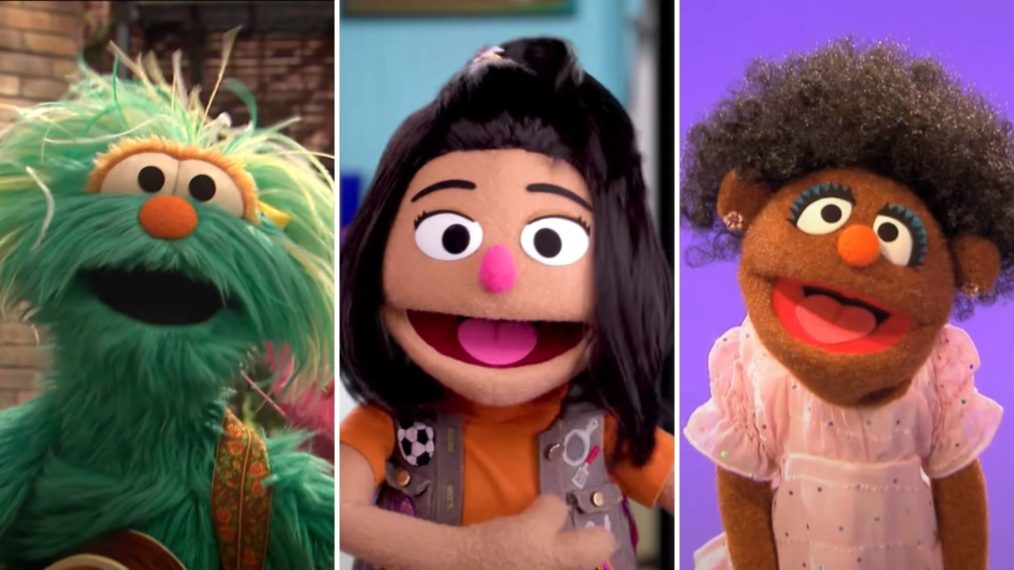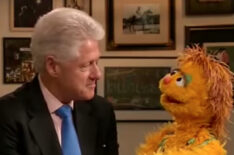8 History-Making Moments (and Muppets) From the ‘Sesame Street’ World

We’ll have another reason to be thankful for Sesame Street this Thanksgiving: The children’s programming staple will introduce Ji-Young, its first-ever Asian American Muppet, in PBS and HBO Max’s See Us Coming Together: A Sesame Street Special on Thursday, November 25.
“My one hope, obviously, is to actually help teach what racism is, help teach kids to be able to recognize it and then speak out against it,” puppeteer Kathleen Kim told the Associated Press. “But then my other hope for Ji-Young is that she just normalizes seeing different kinds of looking kids on TV.”
Of course, Sesame Street—and its international spinoffs—has been championing diversity for decades now. Here are some of the times we witnessed, ahem, a more open Sesame.
1991: Rosita brings a bilingual presence to the show
Speaking both Spanish and English, Rosita made history as the show’s first full-time bilingual puppet, per NPR. Three decades later, the blue-haired Muppet is still making headlines, like when she and Dr. Jill Biden chatted about racial diversity this July.
2002: Kami fights stigmas as the franchise’s first HIV-positive character
The Muppet first appeared on Takalani Sesame, South Africa’s version of the series, and later filmed a UNICEF video with former President Bill Clinton. With a name that refers to the Setswana word for acceptance, Kami “helps teach her Takalani friends about staying healthy and having a great outlook on life,” according to the show.
2006: Mahboub enters the scene as the first Arab-Israeli Muppet
Mahboub, who speaks Hebrew and Arabic, made his debut on Rehov Sumsum, Israel’s version of Sesame Street. Yuli Tamir, then Israel’s minister of education, told the Associated Press that the show and its related educational kit “opens up a new way to deal with issues of conflict—just teaching children how to live together, how to work together with each other despite their differences.”
2010: Segi sings a love letter to her hair
The music video teaches young Black girls to love their hair, too, according to ABC News. Joey Mazzarino, then Sesame Street‘s head writer, wrote the song for his daughter, also named Segi, whom he adopted from Ethiopia. “I just want kids to know their hair is beautiful,” Mazzarino said. “I just hope little kids, little girls see this and really feel positive and great about themselves.”
2013: Alex helps kids understand incarcerated parents
Alex, the first Sesame Street Muppet to have a dad in jail, gave voice to the estimated one in 28 children in the United States who had a parent behind bars. “Coming from a Muppet, it’s almost another child telling their story to the children,” Sesame Workshop exec Jeanette Betancourt told Today.
2016: Zari ranks as the franchise’s first Afghan Muppet
Sesame Workshop introduced Zari on Baghch-e-Simsim, the Afghan version of Sesame Street, to put a spotlight on girls’ empowerment, health, and emotional well-being. “It’s a way of making sure we are not just teaching but we are modeling, which is very powerful,” exec Sherrie Westi explained to The New York Times. “We know children learn best when they can identify themselves with characters on the screen.”
2017: Julia breaks new ground as the first core Muppet with autism
The puppeteer behind the character is Stacey Gordon, the mother of a child with autism, according to Mashable. The inclusion effort became controversial, however: The Autistic Self Advocacy Network ended its partnership with Sesame Street in 2019 after the show promoted resources that “treat autistic people as burdens on our families,” the organization said.
2021: Ji-Young debuts as the first core Asian American Muppet
“So, in Korean, traditionally, the two syllables, they each mean something different, and Ji means, like, smart or wise, And Young means, like, brave or courageous or strong,” the Muppet, brought to life by puppeteer Kathleen Kim, told the Associated Press. “But we were looking it up, and guess what? Ji also means ‘sesame.’”
See Us Coming Together: A Sesame Street Special, Thursday, Nov. 25, HBO Max and PBS
From TV Guide Magazine
How Hulu's 'Mid-Century Modern' Is a 'Golden Girls' for Our Times
Settle in for some older and bolder laughs with the BFFs of a certain age in the new comedy starring Nathan Lane, Matt Bomer, and Nathan Lee Graham. Read the story now on TV Insider.










